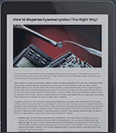Common Misconceptions About Cyanoacrylate Adhesives (And What You May Not Know About Them)
Cyanoacrylates—also known as instant adhesives, superglues, and Krazy Glue—are fast curing adhesives used to form adhesive bonds between surfaces, compatible with a wide range of environmental and operating conditions. They are applied with versatility across industries due to their advantageous properties, which include:
- High adhesive strength. Cyanoacrylates are able to create a strong adhesive bond even between dissimilar or hard-to-bond materials, including ceramics, engineering plastics, metal, rubber and elastomers, and wood. The bond is mechanically strong and evenly distributes stress across the bonded surface for greater durability and longevity.
- Aesthetic appearance. As cyanoacrylates dry clear, they create a visually cleaner line that improves the appearance of assembled products.
- Ease of use. Cyanoacrylates don’t need solvents or multiple bonding components, making them a streamlined option.
Despite these and other benefits, some industry professionals have reservations about using cyanoacrylates. Throughout our years working with adhesives, the team at Aron Alpha has encountered several frequent misconceptions about them that may be preventing manufacturers from making use of them. In the following blog post, we’ll address some of the misconceptions surrounding cyanoacrylates and discuss additional insights about some of their more unusual use cases.
Misconception #1: “Cyano” in “Cyanoacrylates” Implies a Cyanide Presence
The “cyano” root in the term “cyanoacrylates” may give the idea that adhesives contain cyanide—a highly toxic compound. This assumption is incorrect. While some older forms of cyanoacrylates can cause minor skin irritation or allergic reactions, these adhesives are generally considered non-toxic, with some variations receiving approval from the Food and Drug Administration (FDA) for direct skin contact applications.
“Cyano” actually refers to the use of cyanoacrylic acid in the formulation of cyanoacrylate adhesives. The compound is combined with alcohol—such as ethanol, methanol, or 2-octanol—to initiate a reaction that forms cyanoacrylate ester molecules. When exposed to water, these molecules polymerize to create strong bonds between contacting material surfaces.
Misconception #2: Fumes From Cyanoacrylate Application Are Dangerous
Many industrial or high-strength compounds produce fumes that can have a significant negative impact on human health. The effects of these fumes are increased when used in enclosed, poorly ventilated spaces. While cyanoacrylates pose as a possible mild irritant, they are not as harmful – they immediately polymerize and become inert when exposed to moisture (including the water present in the mucous membranes of the respiratory tract).
Any associated health risks of using cyanoacrylates can be further reduced by:
- Performing applications in a well-ventilated or filtered area
- Using respiratory and other protective equipment, such as masks, gloves, and goggles
- Introducing and maintaining more moisture in the work environment
Misconception #3: Any Gloves Work When Applying Cyanoacrylates
When working with cyanoacrylates, like with any other industrial compounds, it is important to utilize the right protective equipment to protect oneself from any possible adverse health effects. While for cyanoacrylates, the risk is relatively minor—mild skin irritation or unintentional bonding to the skin—industry professionals should still wear gloves while using cyanoacrylates to prevent these incidents from occurring. However, this requirement comes with a few caveats.
Wearing gloves when applying cyanoacrylates is essential. However, choosing the wrong type of glove—i.e., made with incompatible materials—can cause more harm than good. When exposed to cyanoacrylates, organic or natural materials, such as cotton and wool, experience a rapid exothermic reaction that generates heat and, potentially, smoke that can cause serious burns or smoke inhalation injuries. Nitrile and other non-woven/non-porous synthetic materials are more suitable materials for gloves intended for cyanoacrylate application as they do not initiate such a reaction.
Unusual Use Cases for Cyanoacrylates
While cyanoacrylates are frequently applied in automotive, medical, and other industrial manufacturing operations to assemble parts and products, did you know that they are also used in some unconventional industrial applications? Here are several examples:
- Tissue bonding. Cyanoacrylates are able to replace traditional sutures used to close cuts and incisions in emergencies and surgeries.
- Bonding live coral fragments. Instant adhesives are safe to use in sensitive marine and aquascaping environments to bond coral to walls, rocks, and more, even in sandy environments.
- Wood turning. Wood enthusiasts and furniture builders use cyanoacrylates to repair broken parts, hold pieces together that can’t be held with clamps, and seal surfaces with small holes.
- Screen printing. Cyanoacrylates form a strong bond with silkscreen meshes and are chemically resistant to printing inks.
- Dental lab model building. These adhesives are suitable for assembling dental devices such as models, crown and bridge pin settings, and more.
- Mortuary operations. After autopsies and embalming, cyanoacrylates can be used to reseal any incisions made to the body.
- Medical device manufacturing. Modern cyanoacrylate formulas demonstrate better thermal resistance and peel strength, making them suitable for use in the production of medical devices and multi-component products.
- 3D printing. 3D printing operations build products layer by layer. Cyanoacrylates can seal product layers and physically bond separate components together for a more durable product or assembly.
- Crime scene investigations. Forensic investigators can use cyanoacrylates to reveal and lift fingerprints at crime scenes.
Cyanoacrylate Solutions at Aron Alpha
Cyanoacrylates are highly versatile adhesives employed across a wide range of industries. In contrast to common assumptions, they are largely non-toxic and safe to use given the proper precautions and protective equipment are implemented.
If you are considering or questioning if cyanoacrylates are right for your needs, the Aron Alpha team is happy to help. Building on over 50 years of consistency and excellent performance, we provide top-notch quality instant adhesives. Our high-performance Industrial Krazy Glue™ is fast drying, easy-to-use, and are found in almost all industries, such as highly technical electronic assembly, general industrial and automotive, and craft-making.
If you have any questions about cyanoacrylates or our adhesives products, reach out to us today.




